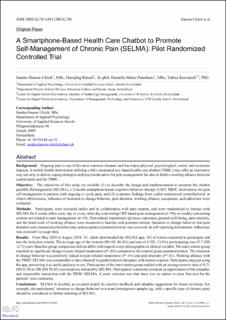Bitte benutzen Sie diese Kennung, um auf die Ressource zu verweisen:
https://doi.org/10.21256/zhaw-19893| Publikationstyp: | Beitrag in wissenschaftlicher Zeitschrift |
| Art der Begutachtung: | Peer review (Publikation) |
| Titel: | A smartphone-based health care chatbot to promote self-management of chronic pain (SELMA) : pilot randomized controlled trial |
| Autor/-in: | Hauser-Ulrich, Sandra Künzli, Hansjörg Meier-Peterhans, Danielle Kowatsch, Tobias |
| et. al: | No |
| DOI: | 10.2196/15806 10.21256/zhaw-19893 |
| Erschienen in: | JMIR mHealth and uHealth |
| Band(Heft): | 8 |
| Heft: | 4 |
| Seite(n): | e15806 |
| Erscheinungsdatum: | Apr-2020 |
| Verlag / Hrsg. Institution: | JMIR Publications |
| ISSN: | 2291-5222 |
| Sprache: | Englisch |
| Schlagwörter: | Conversational agent; Chatbot; Mobile health; Pain self-management; Cognitive behavior therapy; Smartphone; Psychoeducation; Text-based; Health care; Chronic pain |
| Fachgebiet (DDC): | 158: Angewandte Psychologie 610: Medizin und Gesundheit |
| Zusammenfassung: | Background: Ongoing pain is one of the most common diseases and has major physical, psychological, social, and economic impacts. A mobile health intervention utilizing a fully automated text-based health care chatbot (TBHC) may offer an innovative way not only to deliver coping strategies and psychoeducation for pain management but also to build a working alliance between a participant and the TBHC. Objective: The objectives of this study are twofold: (1) to describe the design and implementation to promote the chatbot painSELfMAnagement (SELMA), a 2-month smartphone-based cognitive behavior therapy (CBT) TBHC intervention for pain self-management in patients with ongoing or cyclic pain, and (2) to present findings from a pilot randomized controlled trial, in which effectiveness, influence of intention to change behavior, pain duration, working alliance, acceptance, and adherence were evaluated. Methods: Participants were recruited online and in collaboration with pain experts, and were randomized to interact with SELMA for 8 weeks either every day or every other day concerning CBT-based pain management (n=59), or weekly concerning content not related to pain management (n=43). Pain-related impairment (primary outcome), general well-being, pain intensity, and the bond scale of working alliance were measured at baseline and postintervention. Intention to change behavior and pain duration were measured at baseline only, and acceptance postintervention was assessed via self-reporting instruments. Adherence was assessed via usage data. Results: From May 2018 to August 2018, 311 adults downloaded the SELMA app, 102 of whom consented to participate and met the inclusion criteria. The average age of the women (88/102, 86.4%) and men (14/102, 13.6%) participating was 43.7 (SD 12.7) years. Baseline group comparison did not differ with respect to any demographic or clinical variable. The intervention group reported no significant change in pain-related impairment (P=.68) compared to the control group postintervention. The intention to change behavior was positively related to pain-related impairment (P=.01) and pain intensity (P=.01). Working alliance with the TBHC SELMA was comparable to that obtained in guided internet therapies with human coaches. Participants enjoyed using the app, perceiving it as useful and easy to use. Participants of the intervention group replied with an average answer ratio of 0.71 (SD 0.20) to 200 (SD 58.45) conversations initiated by SELMA. Participants’ comments revealed an appreciation of the empathic and responsible interaction with the TBHC SELMA. A main criticism was that there was no option to enter free text for the patients’ own comments. Conclusions: SELMA is feasible, as revealed mainly by positive feedback and valuable suggestions for future revisions. For example, the participants’ intention to change behavior or a more homogenous sample (eg, with a specific type of chronic pain) should be considered in further tailoring of SELMA. |
| URI: | https://digitalcollection.zhaw.ch/handle/11475/19893 |
| Volltext Version: | Publizierte Version |
| Lizenz (gemäss Verlagsvertrag): | CC BY-NC 4.0: Namensnennung - Nicht kommerziell 4.0 International |
| Departement: | Angewandte Psychologie |
| Organisationseinheit: | Psychologisches Institut (PI) |
| Enthalten in den Sammlungen: | Publikationen Angewandte Psychologie |
Dateien zu dieser Ressource:
| Datei | Beschreibung | Größe | Format | |
|---|---|---|---|---|
| SELMA_ A Digital Coach for Self-Management of Pain.mp4 | 22.64 MB | mp4 | Öffnen/Anzeigen | |
| 2020_Hauser_etal_Smartphone-based-health-care-chatbot_JMIR-mHealth.pdf | 1.4 MB | Adobe PDF |  Öffnen/Anzeigen |
Zur Langanzeige
Hauser-Ulrich, S., Künzli, H., Meier-Peterhans, D., & Kowatsch, T. (2020). A smartphone-based health care chatbot to promote self-management of chronic pain (SELMA) : pilot randomized controlled trial. JMIR mHealth and uHealth, 8(4), e15806. https://doi.org/10.2196/15806
Hauser-Ulrich, S. et al. (2020) ‘A smartphone-based health care chatbot to promote self-management of chronic pain (SELMA) : pilot randomized controlled trial’, JMIR mHealth and uHealth, 8(4), p. e15806. Available at: https://doi.org/10.2196/15806.
S. Hauser-Ulrich, H. Künzli, D. Meier-Peterhans, and T. Kowatsch, “A smartphone-based health care chatbot to promote self-management of chronic pain (SELMA) : pilot randomized controlled trial,” JMIR mHealth and uHealth, vol. 8, no. 4, p. e15806, Apr. 2020, doi: 10.2196/15806.
HAUSER-ULRICH, Sandra, Hansjörg KÜNZLI, Danielle MEIER-PETERHANS und Tobias KOWATSCH, 2020. A smartphone-based health care chatbot to promote self-management of chronic pain (SELMA) : pilot randomized controlled trial. JMIR mHealth and uHealth. April 2020. Bd. 8, Nr. 4, S. e15806. DOI 10.2196/15806
Hauser-Ulrich, Sandra, Hansjörg Künzli, Danielle Meier-Peterhans, and Tobias Kowatsch. 2020. “A Smartphone-Based Health Care Chatbot to Promote Self-Management of Chronic Pain (SELMA) : Pilot Randomized Controlled Trial.” JMIR mHealth and uHealth 8 (4): e15806. https://doi.org/10.2196/15806.
Hauser-Ulrich, Sandra, et al. “A Smartphone-Based Health Care Chatbot to Promote Self-Management of Chronic Pain (SELMA) : Pilot Randomized Controlled Trial.” JMIR mHealth and uHealth, vol. 8, no. 4, Apr. 2020, p. e15806, https://doi.org/10.2196/15806.
Alle Ressourcen in diesem Repository sind urheberrechtlich geschützt, soweit nicht anderweitig angezeigt.